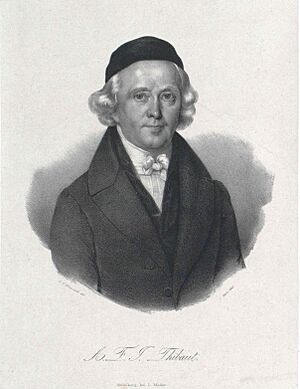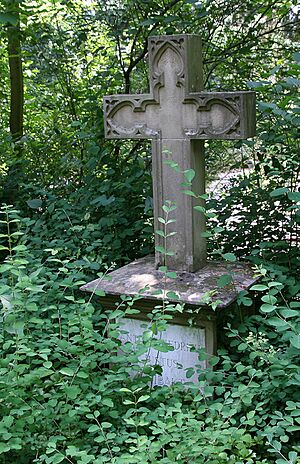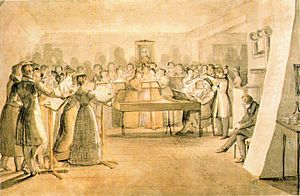Anton Friedrich Justus Thibaut facts for kids
Anton Friedrich Justus Thibaut (born January 4, 1772 – died March 20, 1840) was a German expert in law, also known as a jurist. He was also very passionate about music.
Contents
Early Life and Education
Anton Thibaut was born in Hamelin, a town in Hanover. His father was an officer in the Hanoverian Army. Thibaut came from a French family called Huguenots.
He went to school in Hamelin and Hanover. Then, he studied law at the University of Göttingen. He also studied at Königsberg, where he learned from the famous philosopher Immanuel Kant. Later, he went to the University of Kiel. There, he became a "Privat-dozent," which means he could teach at the university after getting his law degree. His younger brother, Bernhard Friedrich Thibaut, became a mathematician.
A Life in Law
Starting His Career
In 1798, Thibaut became a professor of civil law. Civil law deals with everyday legal matters like property and contracts. That same year, he published a collection of essays about law. One important essay talked about how philosophy helps understand laws.
In 1799, he wrote Theorie der logischen Auslegung des römischen Rechts. This was one of his most important books. He also wrote about criminal law and the law of possession.
His Main Work
In 1802, Thibaut moved to Jena. He spent three years there. In Friedrich Schiller's summer-house, he wrote his most famous book, System des Pandektenrechts (1803). This book became very popular and was printed many times.
It was the first modern and complete guide to Roman law as it was used in Germany. The book was known for being accurate and easy to understand. It helped organize Roman law into a clear system.
Later, Thibaut moved to Heidelberg. He became a professor of civil law there and helped set up the university. He stayed in Heidelberg for the rest of his life. Many students came to his classes. He was one of the most well-known law experts of his time.
Push for New Laws
In 1814, Thibaut wrote a famous essay called Über die Nothwendigkeit eines allgemeinen bürgerlichen Rechts für Deutschland. This means "On the Necessity of a General Civil Law for Germany." He wrote it during the German Wars of Liberation against Napoleon.
Thibaut believed that Germany needed one clear set of laws for the whole country. At that time, different German states had different laws. He thought that having one unified law would be good for Germany.
Another famous law expert, Savigny, disagreed with Thibaut. They had a long debate about how to improve German law. Many people believe Thibaut's idea for a unified law eventually won.
Later Years
In 1819, Thibaut became a member of the parliament in Baden. He also worked in a divorce court. In 1836, he published another book about Roman law. He died in Heidelberg after a short illness.
His Lasting Impact
Thibaut was more than just a law expert. He also loved music and has a place in music history. He especially loved the old church music by composers like Palestrina.
In 1824, he published a book called Über die Reinheit der Tonkunst (Purity of Music). In this book, he praised old music. He was a big collector of old musical pieces. He even paid for young men to travel to Italy to find old music manuscripts.
Thibaut also wrote very well. His writing style was simple but very expressive.
His ideas helped shape the new German civil code, called the Bürgerliches Gesetzbuch, which was created in 1879. The way this code was organized was partly thanks to Thibaut's clear methods.
Even though his own textbooks eventually went out of use, his influence was important. A legal philosopher named John Austin said that Thibaut was one of the best law experts of his time.
See also
 In Spanish: Anton Friedrich Justus Thibaut para niños
In Spanish: Anton Friedrich Justus Thibaut para niños
 | Stephanie Wilson |
 | Charles Bolden |
 | Ronald McNair |
 | Frederick D. Gregory |




